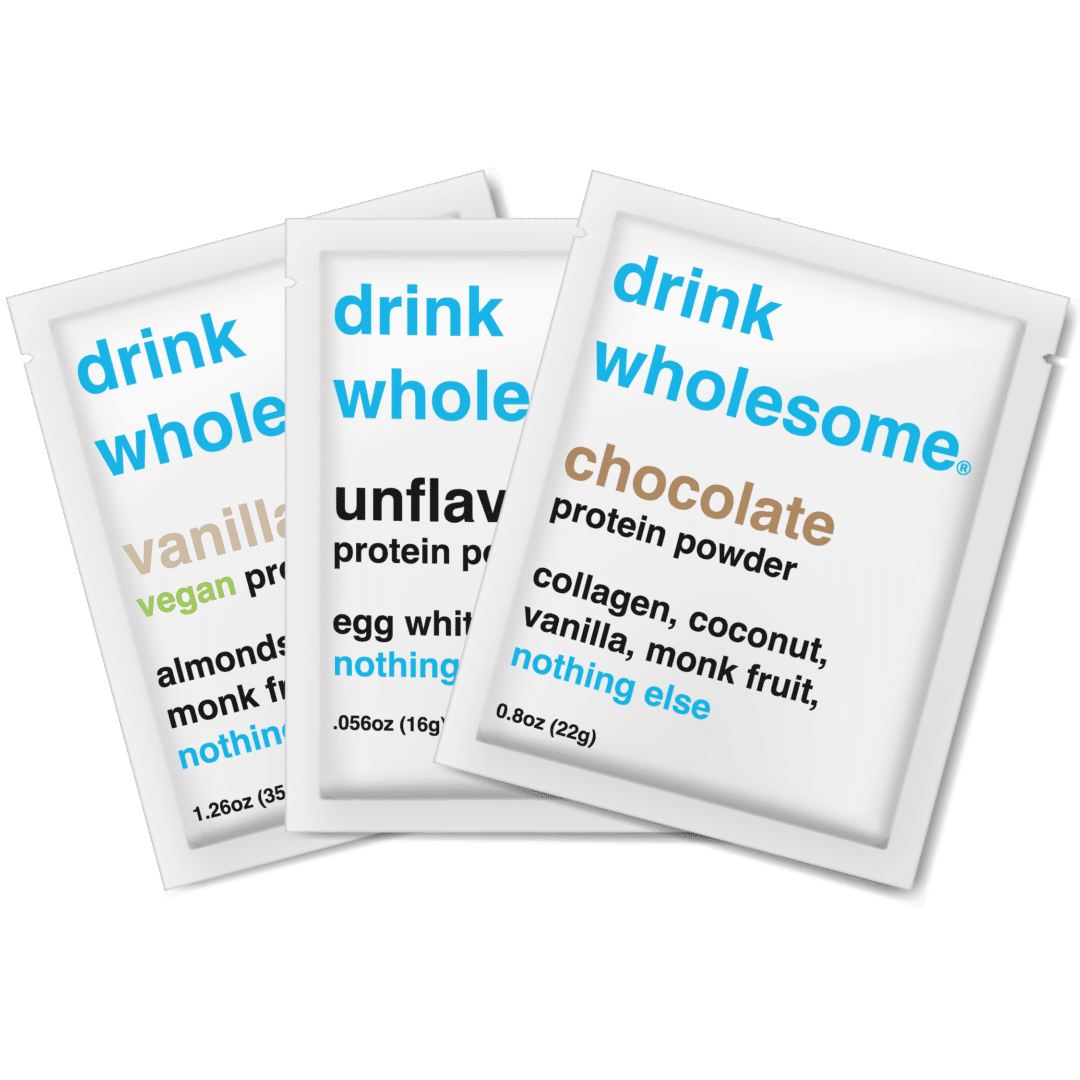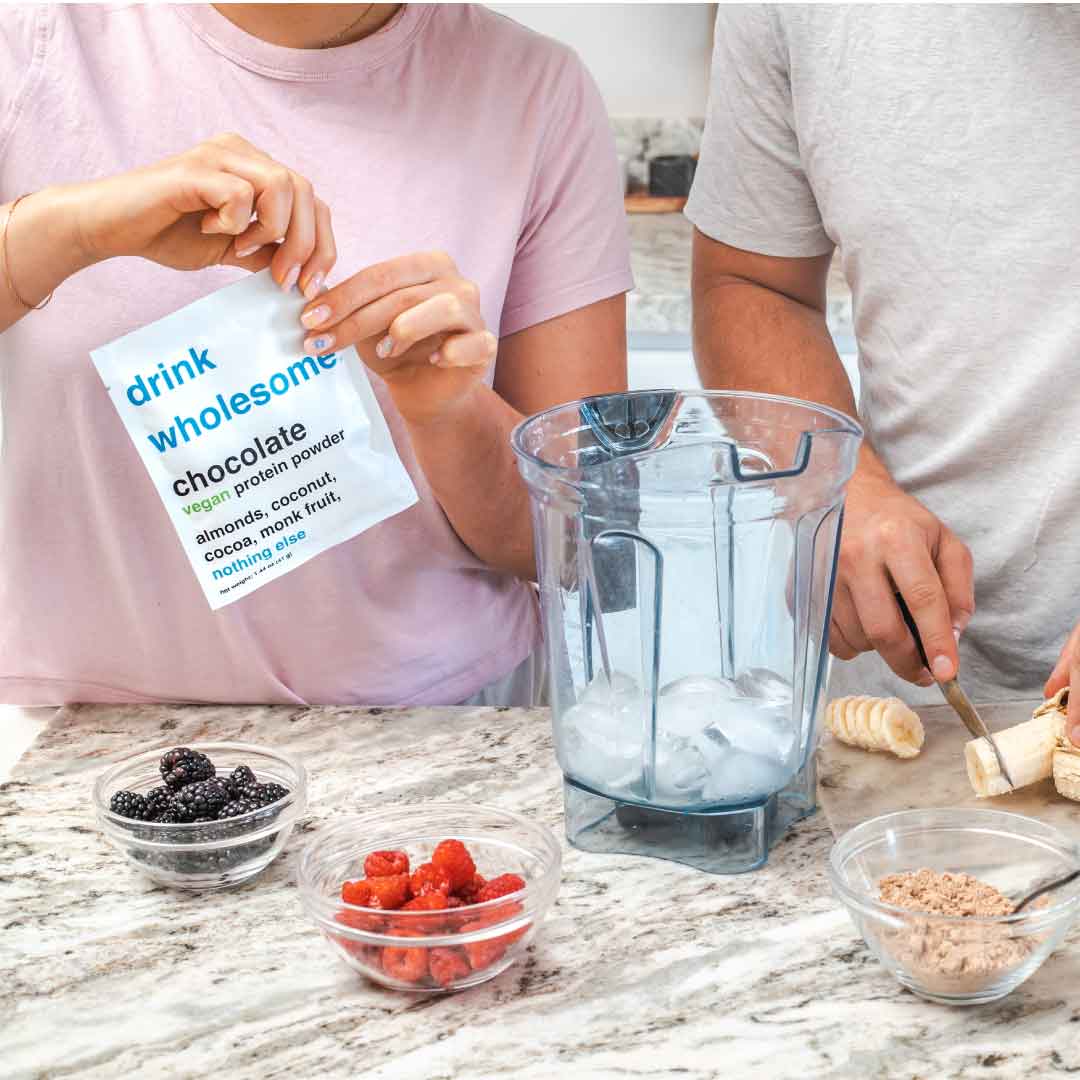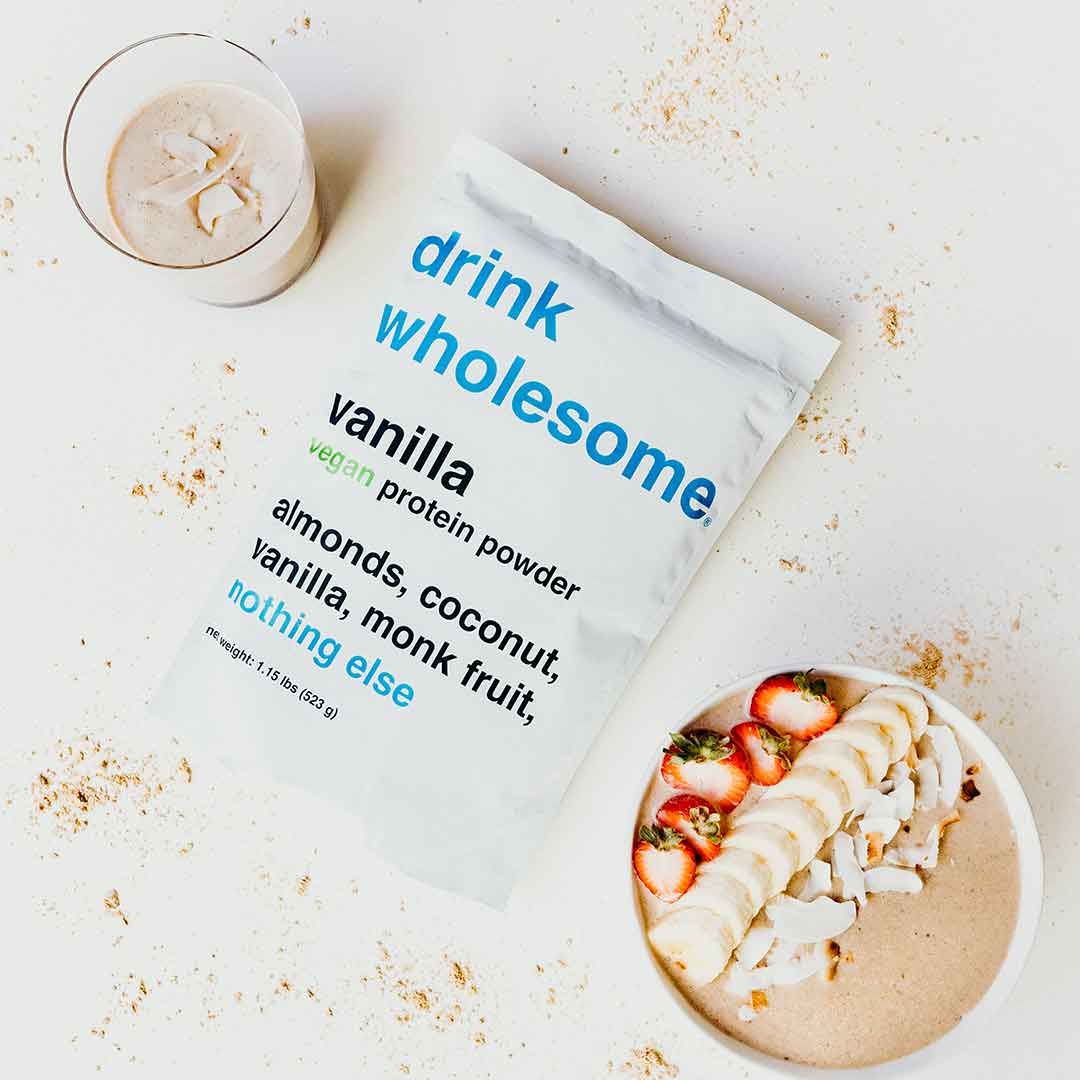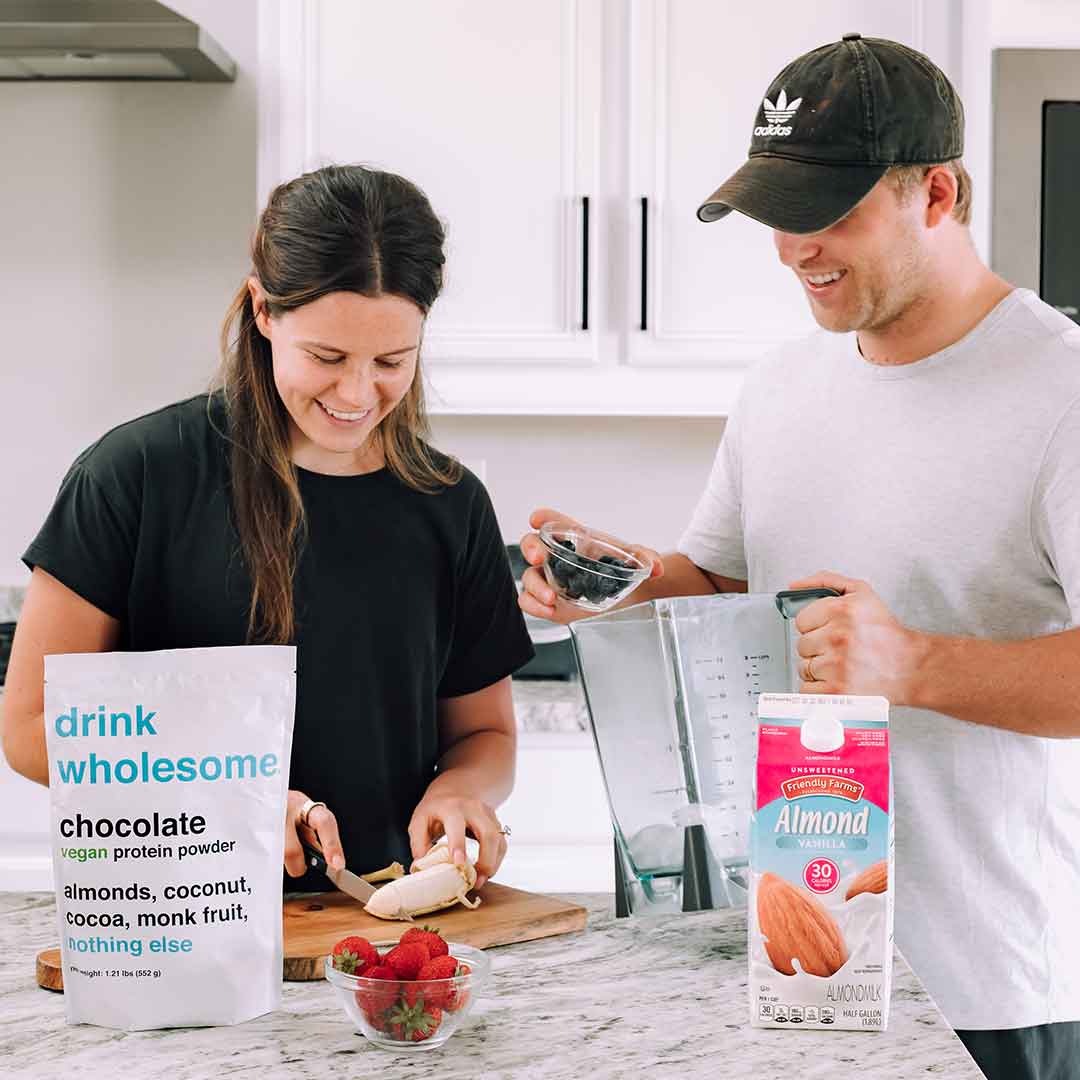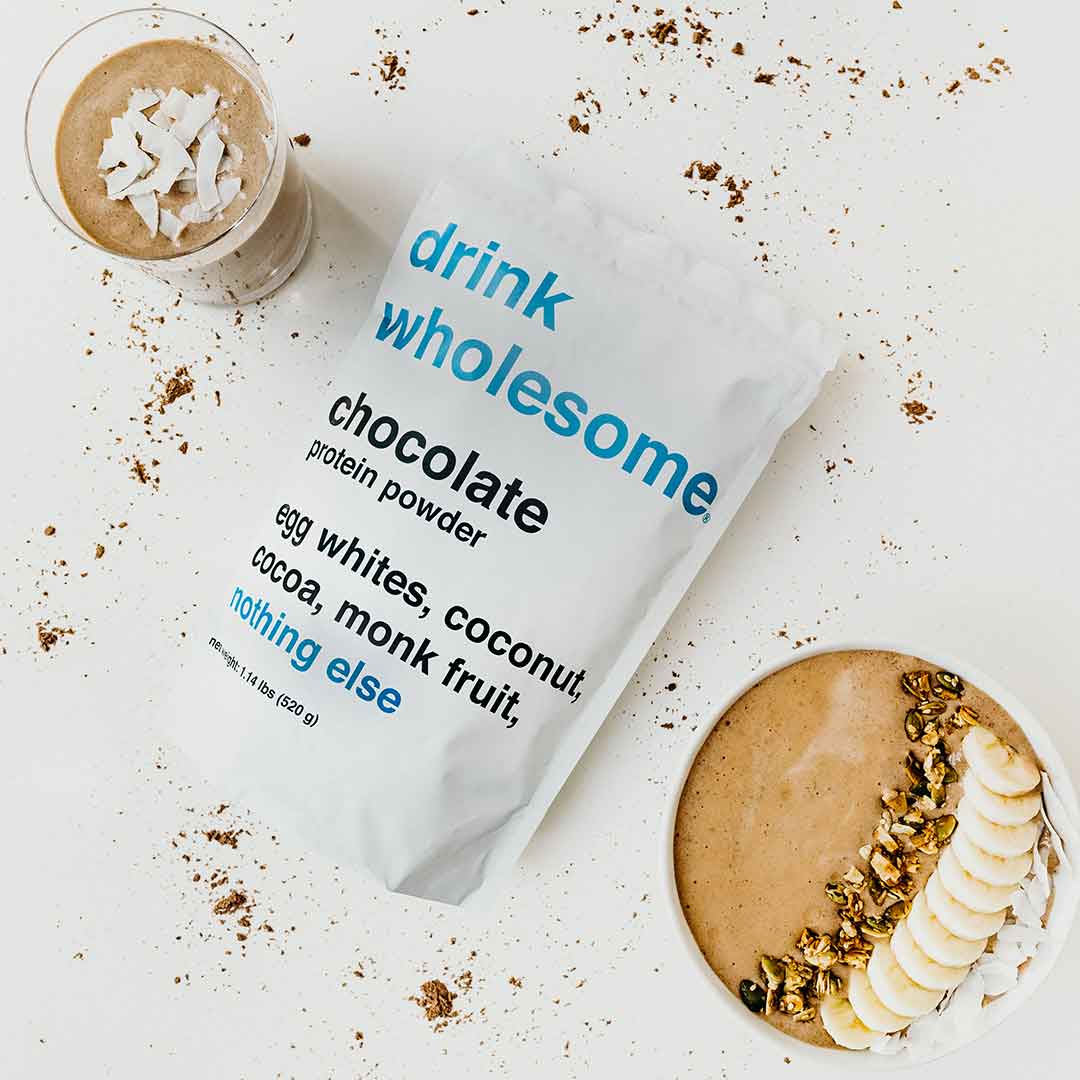Instead of using protein concentrates or isolates, we make protein powder with egg whites and almonds. These minimally-processed ingredients are a gut-friendly alternative to protein concentrates and isolates,
In addition to retaining their natural digestive aids, egg whites and almonds provide several gut health benefits. Almonds are prebiotic, enhancing the microbial diversity of your gut. Egg whites, on the other hand, are low in fiber, low in FODMAPs, alkaline (supporting healthy gut pH levels), and bioactive (encouraging the growth of healthy gut bacteria). Our happy customers have always reported fewer digestive issues when using our egg white protein powder than when using any other protein supplement.
In summary, by making our protein powders with simple ingredients, we allow you to boost your protein intake without bloating.
Ways to reduce bloating from protein powder
Here are a few additional strategies you can implement to further reduce bloating and promote digestive health:
Start with small servings
When introducing a new protein powder into your diet, start with smaller servings and gradually increase the serving size over time. This allows your body to adjust and reduces the risk of bloating. If possible, spread out your protein powder intake throughout the day by incorporating smaller servings into multiple meals or snacks.
Stay hydrated
Proper hydration is crucial for digestion. Be sure to drink enough water throughout the day, especially when consuming protein powder. Water helps facilitate the digestion process and prevents constipation, a common cause of bloating.
Avoid mixing protein powder with gas-inducing foods
Avoid pairing your protein powder with high-fiber fruits and veggies.
Use gut-friendly herbs to support your digestion
Carminative herbs such as ginger, fennel, lemon balm, and peppermint leaf are all great options that can help relieve trapped gas and help to soothe bloating. Try adding these herbs to your smoothies.
Listen to your body
Pay attention to how your body responds to different protein powders. Your digestive system is unique, so what works for you may not work for someone else. If a particular protein powder consistently causes bloating or discomfort, try an alternative.
Ways to reduce bloating in general
Beyond protein powders, making certain lifestyle changes can significantly reduce bloating and optimize your digestive health. By prioritizing regular exercise, stress management, and mindful eating, you can create a balanced lifestyle that supports a happy and healthy gut.
Regular exercise
Regular physical activity plays a crucial role in preventing and relieving bloating. Exercise helps stimulate bowel movements, promotes healthy digestion, and reduces gas buildup in the intestines. Regular exercise has been known to strengthen muscles in the gastrointestinal (GI) tract, which improves intestinal contractions and stimulates the movement of waste throughout the large intestine.
Engaging in activities such as walking, jogging, yoga, or cycling can enhance intestinal motility and alleviate bloating. Aim for at least 30 minutes of moderate-intensity exercise most days of the week to experience the maximum benefits.
Stress management
Stress can have a significant impact on your digestion and contribute to bloating. When you are stressed, your body releases stress hormones that can disrupt normal digestive processes. Incorporating stress management techniques such as meditation and deep breathing exercises can help reduce stress levels and alleviate bloating. Prioritizing self-care and finding activities that relax you can also have a positive impact on your digestive health.
Mindful eating
Practicing mindful eating habits can help prevent bloating and promote improved digestion. Eating slowly, chewing your food thoroughly, and paying attention to your body’s hunger and fullness cues can prevent overeating and reduce the likelihood of bloating. Additionally, avoiding distractions like television or smartphones during meals and being mindful of portion sizes can support healthy digestion and minimize bloating.
Integrative approaches to gut health
In addition to choosing the right protein powder, incorporating, digestive enzymes, and gut-healing nutrients in your diet can further improve your digestive wellness. This holistic approach works in synergy with a high-protein diet to promote a healthy gut and minimize GI discomfort.
Probiotics and prebiotics
Probiotics are beneficial bacteria that can support a healthy gut microbiome. By promoting the growth of good bacteria, probiotics help maintain a balanced digestive system and alleviate bloating. Incorporating probiotic-rich foods like yogurt, kefir, sauerkraut, and kimchi into your diet can help enhance gut health.
Prebiotics, on the other hand, are specialized fibers that act as nourishment for probiotics, fostering their growth and activity within the gut microbiome. By providing a favorable environment for probiotics to thrive, prebiotics contribute to a balanced digestive system and help alleviate bloating. Incorporating prebiotic-rich foods such as garlic, onions, bananas, dark leafy greens, broccoli sprouts, and asparagus into your diet can effectively support the growth of beneficial bacteria and promote optimal gut health.
Digestive enzymes
Digestive enzymes play a crucial role in breaking down food and ensuring efficient nutrient absorption. When your body lacks certain enzymes, it may struggle to digest proteins and other macronutrients, leading to bloating. Supplementing with digestive enzymes can aid in the digestion process, reducing the likelihood of bloating after consuming protein powders. Look for enzyme blends that include protease, amylase, lipase, and lactase enzymes to support optimal digestion.
Gut-Healing nutrients
In conjunction with a high-protein diet, ensuring your body receives well-rounded nutrition is essential for supporting optimal gut health and reducing inflammation in the digestive system. Certain key nutrients have been identified for their role in promoting gut healing and mitigating inflammation, including glutamine, zinc, omega-3 fatty acids, and vitamin A. Incorporating these nutrients into your diet not only complements the benefits of a protein-rich regimen, but also provides vital support for overall digestive wellness, helping to maintain a healthy gut microbiome and alleviate gastrointestinal discomfort.
easy to digest
“I love this stuff!! I currently have vanilla, chocolate, and PB, and love all 3😍😍😍. Finally found a protein powder that doesn’t make me bloated.” – Kayla
Read more reviews or take the quiz.


